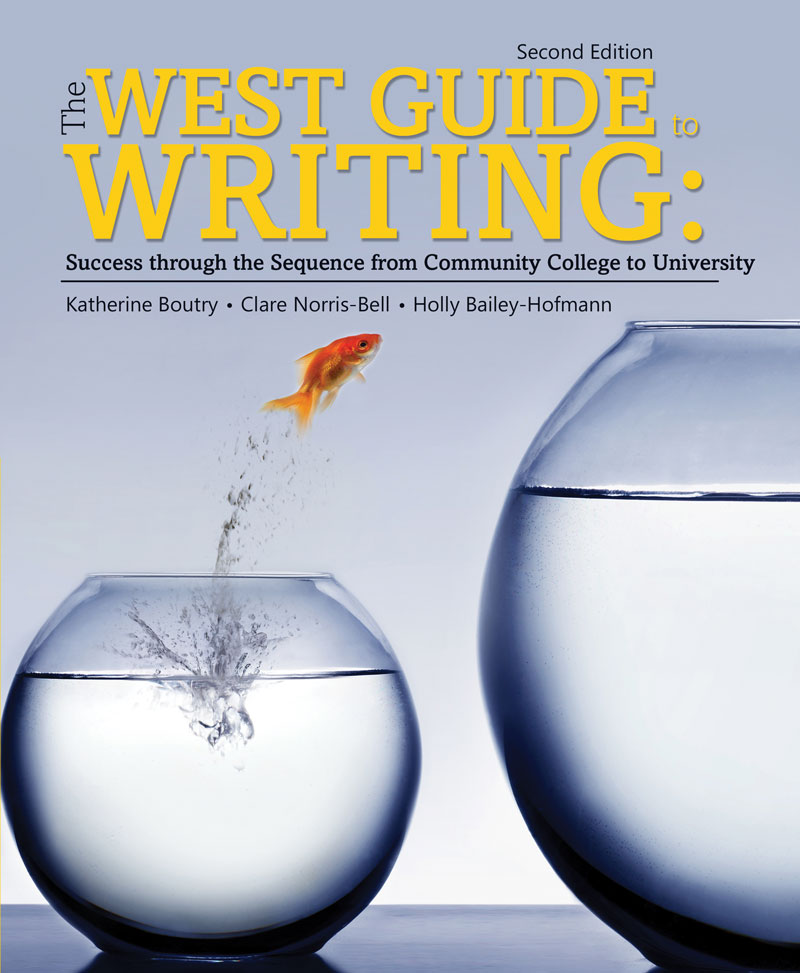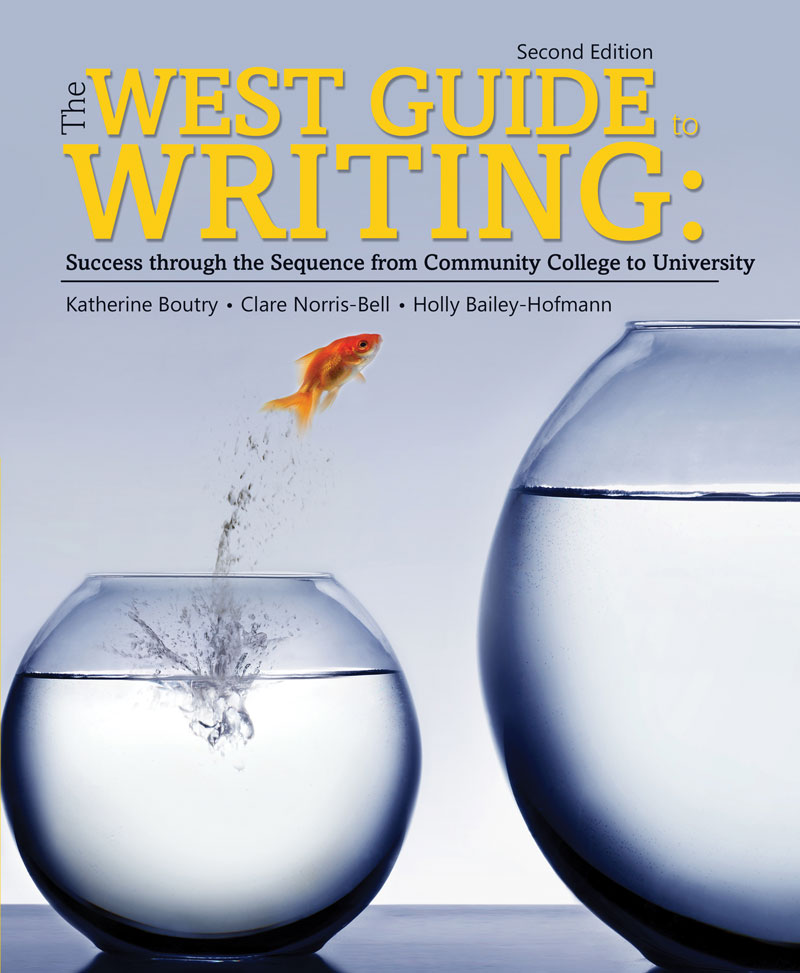The West Guide to Writing: Success through the Sequence from Community College to University
Author(s): Katherine Boutry , Clare Norris , Holly Bailey-Hofmann
Edition: 2
Copyright: 2018
Pages: 512
Edition: 2
Copyright: 2018
Pages: 512
Writing is a strength - or weakness - for students in all their classes. Becoming a successful writer gives students an advantage. The West Guide to Writing: Success from Community College to University gives the reader the keys to succeed!
Written by three full-time English professors with a combined thirty years of teaching at both the community college and university levels, The West Guide to Writing is an affordable, compact, comprehensive, timely, and accurate textbook.
The West Guide to Writing: Success from Community College to University:
- Is the only composition textbook students will ever need! The textbook can be used at any level in the composition sequence, from the foundational classes to advanced classes such as "Critical Thinking and Composition" and "Introduction to Literature."
- Includes numerous instructor resources to make the transition easy! A teacher's guide, sample syllabi for various course levels, and recommended supplemental readings are provided on an accompanying website.
- Features a nice balance of readings - including some favorite standards to illustrate concepts.
- Presents unique student success and learning tools - including time management, learning styles, active reading, student and class success strategies, and more to enhance students' entire educational experience.
- Blends a composition textbook with an MLA/APA/Chicago Style guidebook - includes basic grammatical concepts that students encounter on a consistent basis.
SECTION I Be a Success in Class
1 SCHEDULING YOURSELF FOR SUCCESS
Create a Schedule that Works
Make Time for Assignments
2 CLASS SUCCESS STRATEGIES
Use Your College Community
Professors
Classmates
Tutors
Librarians
Find Your Voice and Make It Count
Learn How You Learn
Learning and Teaching Modes
Memorization Tools
Learning Differences
Take Your Learning Inventory
Ace In-Class Presentations
Make the Most of Your Online Classes
Take Student Advice
SECTION II Start With A Good Foundation
3 READING
Reading Fundamentals
Improving Your Reading Fluency
Comprehension
The Reading Process
Writing a Summary
4 PARTS OF SPEECH
Nouns/Subjects/Objects
Pronouns
Verbs
Helping Verbs, Linking and Compound Verbs, Infinitive Verbs
Adjectives
Adverbs
Prepositions
Articles
Interjections
Conjunctions
Connections Among Languages
5 PUNCTUATION
Commas
Apostrophes
End Punctuation
Quotation Marks
Semicolons
Colons
Hyphens, Dashes, and Parentheses
6 GRAMMAR AND USAGE
Capitalization
Pronoun Challenges
What is a Pronoun?
Antecedents
The Second Person Pronoun “You”
Pronoun Reference
Pronouns and Antecedents Must Agree!
Who, Whom, Which, That
Subject/Verb Agreement
Run-ons, Comma Splices, and Sentence Fragments
Commonly-Confused Words
7 ADVANCED GRAMMAR AND STYLE
More Run-On and Fragment Solutions
Active Voice and Action Verbs
Using an Academic Tone
8 FOR ENGLISH LANGUAGE LEARNERS
Articles
Noncount Nouns
Verb Tenses
Modal Verbs
Subject/Verb Agreement for Nonnative Speakers
Gerunds and Infinitives
Idioms
Prepositions of Time and Place
SECTION III Apply the Writing Process
9 PREWRITING
Reading
Thinking
Talking
Listing
Mapping
Freewriting
Questioning
Outlining
10 DRAFTING THE ESSAY: ESSENTIAL ELEMENTS
The Thesis Statement
Topic Sentences
Transitions
11 PROVE IT!: THE FIVE TYPES OF EVIDENCE
Data/Statistics
Experts
Personal Experience
Values
Hypotheticals
12 WRITING INTRODUCTIONS
13 WRITING CONCLUSIONS
14 REVISING AND POLISHING
Giving Your Essay a Title
Revising
Proofreading
Rubric for Peer or Self-Review
Submitting Drafts
Polishing
MLA Formatting
SECTION IV Select an Essay Type
15 FOUNDATIONAL MODES OF ARGUMENTATION
Causal Analysis
Classification
Comparing and Contrasting
Extended Definition
Narrative
Process Analysis
16 ANALYZING VISUAL ARGUMENTS
What Is a Target Audience?
How Do I Start?
How Do I Write an Essay about the Visual?
Sample Student Essays:
“Destroy the Brute”
“Keeping up with the Joneses”
17 ADVANCED MODES OF ARGUMENTATION
Introduction to Logical Argument
Deductive Reasoning
Inductive Reasoning
Logical Fallacies
Three Traditional Modes of Argumentation
Classical Argument
Toulmin Argument
Rogerian Argument
Sample Essay: “Reproductive Rights Protect Us All”
18 IN-CLASS ESSAY EXAM STRATEGIES
SECTION V Be a Researcher
19 CONDUCTING RESEARCH
Choosing a Topic
Primary Sources
Secondary Sources
Finding Sources
Library Databases
Beginning Research
Writing with Research
Create a Quote Sandwich
Use In-Text Citation
Special Case: Writing the Primary Research Essay
Primary Research in the Real World
Get Started: Choosing a Research Question
Conducting the Primary Research Project: Overview
Gathering Data
Conducting Surveys
Conducting Interviews
Compiling Data
Structuring the Primary Research Essay
20 DOCUMENTING YOUR SOURCES
Why Cite?
Citing Sources
Example MLA In-Text Citation Excerpt
MLA Citation Models
APA Citation Models
Chicago Citation Models
Citation Documents
Sample Works Cited Page
Sample Bibliography
Sample Annotated Bibliography
Figures, Tables, and Appendices
SECTION VI Analyze Literature
21 INTRODUCTION TO LITERARY ELEMENTS
Plot
Point of View
Character
Setting
Theme
22 INTRODUCTION TO GENRE
Drama
Fiction
Poetry
23 WRITING ESSAYS ABOUT LITERATURE
The Goals of English
Close Reading
Thesis Statements for Literature Papers
Adding Contextual Information
Close Reading a Novel: An Extended Example
Literary Criticism
Decoding Assigned Topics
Devising Your Own Topics
Close Reading Literary Theory
Emotion and Tone
Sample Student Essays
“Marriage in Jane Austen”
“Lolita, a Case in Point”
SECTION VII Go Beyond College Writing
24 WRITING THE TRANSFER APPLICATION ESSAY
Sample Transfer Essays
25 GET A JOB! PROFESSIONAL WRITING
Sample Resumes
Cover Letters
Sample Cover Letter
E-mail Correspondence
26 FOR INTERNATIONAL STUDENTS
The American College and University Classroom
American Grading Scale
Professor/Student Roles
Seeking Help
Creating Original Content
Put Yourself Out There!
APPENDIX Readings
A Converation with Alfredo Quiñones-Hinojosa
“Victims from Birth” Wendy McElroy
“What Fathers Do Best” Steven Rhoads
“The Singer Solution to World Poverty” Peter Singer
“Fresh Faces” Sascha de Gersdorff
Index
Dr. Katherine Boutry got her PhD in English at Harvard University where she taught for ten years, first as a graduate teaching fellow and then as a lecturer after earning her degree. While at Harvard, she served as Assistant Director of Undergraduate Studies, advising English Majors and seeing firsthand what made for successful students. She won numerous teaching awards at Harvard and was a Derek Bok Writing Fellow. She first taught writing as a tutor in the Writing Lab at MIT. She got her BA and MA in English at Georgetown University and spent a post-graduate semester at the Sorbonne in Paris. As a graduate student, she had a Fulbright Scholarship to the Czech Republic. Dr. Boutry is also a produced television writer. She has loved teaching the students at West Los Angeles College since 2006 and preparing them for transfer.
Clare Norris-Bell is a fourth generation educator. She earned her BA in Social Relations with an English minor from the University of California, Riverside, her MA in English from the University of Texas, San Antonio, and her certificate in Postsecondary Reading and Learning from California State University, Fullerton. She taught elementary school before earning her MA and has been tutoring and teaching community college students since 2002. She was selected as the faculty chair for West’s student success efforts and has traveled around the country networking and participating in professional development opportunities connected to student success. She has taught virtually all levels of English at West, and she especially loves supporting students as they blossom into college-level writers.
Holly Bailey-Hofmann has a BA in English from St. Mary’s College of Maryland, where she studied poetry with Lucille Clifton. She earned her MA in English from the University of Cincinnati and specializes in language, linguistics, and learning strategies. Once her high school’s graduating Latin scholar, she enjoys teaching students effective techniques for memorization, learning, and test-taking. Holly teaches the range of classes in the English sequence, from grammar and composition to literature and creative writing. In 2010 she founded the college’s annual research poster fair, which she directed for many years. She has served as both vice president and president of the Academic Senate, and in 2016 began pursuing her doctorate in Educational Leadership at UCLA.
Writing is a strength - or weakness - for students in all their classes. Becoming a successful writer gives students an advantage. The West Guide to Writing: Success from Community College to University gives the reader the keys to succeed!
Written by three full-time English professors with a combined thirty years of teaching at both the community college and university levels, The West Guide to Writing is an affordable, compact, comprehensive, timely, and accurate textbook.
The West Guide to Writing: Success from Community College to University:
- Is the only composition textbook students will ever need! The textbook can be used at any level in the composition sequence, from the foundational classes to advanced classes such as "Critical Thinking and Composition" and "Introduction to Literature."
- Includes numerous instructor resources to make the transition easy! A teacher's guide, sample syllabi for various course levels, and recommended supplemental readings are provided on an accompanying website.
- Features a nice balance of readings - including some favorite standards to illustrate concepts.
- Presents unique student success and learning tools - including time management, learning styles, active reading, student and class success strategies, and more to enhance students' entire educational experience.
- Blends a composition textbook with an MLA/APA/Chicago Style guidebook - includes basic grammatical concepts that students encounter on a consistent basis.
SECTION I Be a Success in Class
1 SCHEDULING YOURSELF FOR SUCCESS
Create a Schedule that Works
Make Time for Assignments
2 CLASS SUCCESS STRATEGIES
Use Your College Community
Professors
Classmates
Tutors
Librarians
Find Your Voice and Make It Count
Learn How You Learn
Learning and Teaching Modes
Memorization Tools
Learning Differences
Take Your Learning Inventory
Ace In-Class Presentations
Make the Most of Your Online Classes
Take Student Advice
SECTION II Start With A Good Foundation
3 READING
Reading Fundamentals
Improving Your Reading Fluency
Comprehension
The Reading Process
Writing a Summary
4 PARTS OF SPEECH
Nouns/Subjects/Objects
Pronouns
Verbs
Helping Verbs, Linking and Compound Verbs, Infinitive Verbs
Adjectives
Adverbs
Prepositions
Articles
Interjections
Conjunctions
Connections Among Languages
5 PUNCTUATION
Commas
Apostrophes
End Punctuation
Quotation Marks
Semicolons
Colons
Hyphens, Dashes, and Parentheses
6 GRAMMAR AND USAGE
Capitalization
Pronoun Challenges
What is a Pronoun?
Antecedents
The Second Person Pronoun “You”
Pronoun Reference
Pronouns and Antecedents Must Agree!
Who, Whom, Which, That
Subject/Verb Agreement
Run-ons, Comma Splices, and Sentence Fragments
Commonly-Confused Words
7 ADVANCED GRAMMAR AND STYLE
More Run-On and Fragment Solutions
Active Voice and Action Verbs
Using an Academic Tone
8 FOR ENGLISH LANGUAGE LEARNERS
Articles
Noncount Nouns
Verb Tenses
Modal Verbs
Subject/Verb Agreement for Nonnative Speakers
Gerunds and Infinitives
Idioms
Prepositions of Time and Place
SECTION III Apply the Writing Process
9 PREWRITING
Reading
Thinking
Talking
Listing
Mapping
Freewriting
Questioning
Outlining
10 DRAFTING THE ESSAY: ESSENTIAL ELEMENTS
The Thesis Statement
Topic Sentences
Transitions
11 PROVE IT!: THE FIVE TYPES OF EVIDENCE
Data/Statistics
Experts
Personal Experience
Values
Hypotheticals
12 WRITING INTRODUCTIONS
13 WRITING CONCLUSIONS
14 REVISING AND POLISHING
Giving Your Essay a Title
Revising
Proofreading
Rubric for Peer or Self-Review
Submitting Drafts
Polishing
MLA Formatting
SECTION IV Select an Essay Type
15 FOUNDATIONAL MODES OF ARGUMENTATION
Causal Analysis
Classification
Comparing and Contrasting
Extended Definition
Narrative
Process Analysis
16 ANALYZING VISUAL ARGUMENTS
What Is a Target Audience?
How Do I Start?
How Do I Write an Essay about the Visual?
Sample Student Essays:
“Destroy the Brute”
“Keeping up with the Joneses”
17 ADVANCED MODES OF ARGUMENTATION
Introduction to Logical Argument
Deductive Reasoning
Inductive Reasoning
Logical Fallacies
Three Traditional Modes of Argumentation
Classical Argument
Toulmin Argument
Rogerian Argument
Sample Essay: “Reproductive Rights Protect Us All”
18 IN-CLASS ESSAY EXAM STRATEGIES
SECTION V Be a Researcher
19 CONDUCTING RESEARCH
Choosing a Topic
Primary Sources
Secondary Sources
Finding Sources
Library Databases
Beginning Research
Writing with Research
Create a Quote Sandwich
Use In-Text Citation
Special Case: Writing the Primary Research Essay
Primary Research in the Real World
Get Started: Choosing a Research Question
Conducting the Primary Research Project: Overview
Gathering Data
Conducting Surveys
Conducting Interviews
Compiling Data
Structuring the Primary Research Essay
20 DOCUMENTING YOUR SOURCES
Why Cite?
Citing Sources
Example MLA In-Text Citation Excerpt
MLA Citation Models
APA Citation Models
Chicago Citation Models
Citation Documents
Sample Works Cited Page
Sample Bibliography
Sample Annotated Bibliography
Figures, Tables, and Appendices
SECTION VI Analyze Literature
21 INTRODUCTION TO LITERARY ELEMENTS
Plot
Point of View
Character
Setting
Theme
22 INTRODUCTION TO GENRE
Drama
Fiction
Poetry
23 WRITING ESSAYS ABOUT LITERATURE
The Goals of English
Close Reading
Thesis Statements for Literature Papers
Adding Contextual Information
Close Reading a Novel: An Extended Example
Literary Criticism
Decoding Assigned Topics
Devising Your Own Topics
Close Reading Literary Theory
Emotion and Tone
Sample Student Essays
“Marriage in Jane Austen”
“Lolita, a Case in Point”
SECTION VII Go Beyond College Writing
24 WRITING THE TRANSFER APPLICATION ESSAY
Sample Transfer Essays
25 GET A JOB! PROFESSIONAL WRITING
Sample Resumes
Cover Letters
Sample Cover Letter
E-mail Correspondence
26 FOR INTERNATIONAL STUDENTS
The American College and University Classroom
American Grading Scale
Professor/Student Roles
Seeking Help
Creating Original Content
Put Yourself Out There!
APPENDIX Readings
A Converation with Alfredo Quiñones-Hinojosa
“Victims from Birth” Wendy McElroy
“What Fathers Do Best” Steven Rhoads
“The Singer Solution to World Poverty” Peter Singer
“Fresh Faces” Sascha de Gersdorff
Index
Dr. Katherine Boutry got her PhD in English at Harvard University where she taught for ten years, first as a graduate teaching fellow and then as a lecturer after earning her degree. While at Harvard, she served as Assistant Director of Undergraduate Studies, advising English Majors and seeing firsthand what made for successful students. She won numerous teaching awards at Harvard and was a Derek Bok Writing Fellow. She first taught writing as a tutor in the Writing Lab at MIT. She got her BA and MA in English at Georgetown University and spent a post-graduate semester at the Sorbonne in Paris. As a graduate student, she had a Fulbright Scholarship to the Czech Republic. Dr. Boutry is also a produced television writer. She has loved teaching the students at West Los Angeles College since 2006 and preparing them for transfer.
Clare Norris-Bell is a fourth generation educator. She earned her BA in Social Relations with an English minor from the University of California, Riverside, her MA in English from the University of Texas, San Antonio, and her certificate in Postsecondary Reading and Learning from California State University, Fullerton. She taught elementary school before earning her MA and has been tutoring and teaching community college students since 2002. She was selected as the faculty chair for West’s student success efforts and has traveled around the country networking and participating in professional development opportunities connected to student success. She has taught virtually all levels of English at West, and she especially loves supporting students as they blossom into college-level writers.
Holly Bailey-Hofmann has a BA in English from St. Mary’s College of Maryland, where she studied poetry with Lucille Clifton. She earned her MA in English from the University of Cincinnati and specializes in language, linguistics, and learning strategies. Once her high school’s graduating Latin scholar, she enjoys teaching students effective techniques for memorization, learning, and test-taking. Holly teaches the range of classes in the English sequence, from grammar and composition to literature and creative writing. In 2010 she founded the college’s annual research poster fair, which she directed for many years. She has served as both vice president and president of the Academic Senate, and in 2016 began pursuing her doctorate in Educational Leadership at UCLA.




